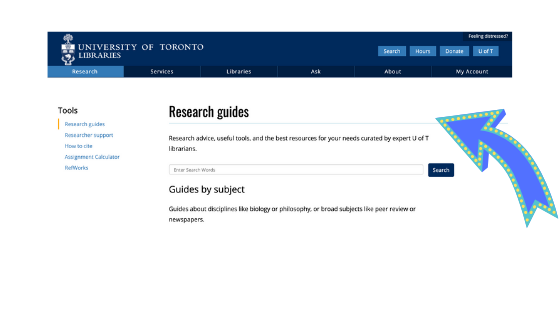Friday, November 22nd, 2019...3:58 pm
Revisiting Approaches to Research
Hello and welcome back to the Gradlife blog! I am happy you’re here. This week’s topic is one that I am sure many of you are familiar with: research.
A huge part of many graduate degrees is a research project. Rather than sugar plums, it might be visions of dissertations and theses dancing in your head this holiday season. There are many reasons research projects can be stressful. There is the element of time, getting results, getting enough participants and the list goes on. But even before that, there is deciding a research topic and putting together the project itself.
Some students at a recent Grad Escape event noted that formulating and getting a research project together is one of the most stressful parts of their degree. Therefore, I have put together a blog post with tips on graduate research and resources that might be helpful at UofT and online. So with that, let’s get started!
There are many stages to putting together a research project. Here are some general tips that can be helpful at any stage.
- Be inclusive with your brainstorming. Brainstorm your ideas with your research supervisor, and others who are experienced in your field
- Don’t eliminate ideas too quickly. Who knows where it could lead?! Think them through and see how many different research projects you can come up with. Flex those creative muscles.
- Write down your ideas. That way you can come back to something later on. If you’re constantly thinking of ideas of developing and changing them in your head, it might make you feel that things aren’t progressing are going anywhere.
The following steps from the book by Robert Smith, Graduate Research: A Guide for Students in the Sciences (1984: ISI Press) can be helpful in being strategic about your project:
- Can it be enthusiastically pursued?
- Will it sustain your interest?
- Is the problem solvable?
- Is it worth doing?
- Will it lead to other research problems?
- Is it manageable in size?
- What is the potential for making an original contribution to the literature?
- Will the research prepare you in an area of demand or promise for the future?
Don’t forget about time ! Managing your time with any project is a key part of graduate school, since we all tend to have other things going on in life as well. If you feel that your project is going to require more time and energy than you can or are willing to give, then it might be good to reassess. It can also help to create a timeline, like the one suggested below (source).
Some helpful tips when creating a timeline:
- Put a start and a finish time for each step.
- Put your timeline in a place you can see it regularly (above your computer monitor, the front of a well used notebook) so that it reminds you how you’re doing.
- Update your timeline as you see fit, such as when something comes up you didn’t expect, or something takes longer than anticipated.
Stage 1 — Thinking About It
Stage 2 — Preparing the Proposal
Stage 3 — Conducting the Research
Stage 4 — Writing the Thesis/Dissertation
Stage 5 — Sharing the Document with Others
Stage 6 — Revising the Thesis/Dissertation
Resources at U of T
As mentioned above, when it comes to forming your project and keeping the momentum, your supervisory relationship can be extremely important and helpful. Therefore, in order to make sure you get the most out of this, these resources are available!
Use the Library
When it comes to collecting research, the library is a great resource in so many ways.
- Chatting with a librarian- they can answer your questions and help to find useful resources and research.
- Taking a workshop. (Intro to Data Visualization, Advanced SPSS, Using NVivo as a Research Tool and more!)
- Research Guides
Academic Support
If you find you need to adjust your studying techniques, or want to chat with a mentor from your field, head on over to Academic Success for Grad Students.
If you are a student registered with Accessibility Services or are thinking of doing so, you can check out their website for information on peer programs, graduate dialogues and workshops!
See how others are doing it!
- Blog post articles
- Youtube videos from PhD candidate at U of T, Jacqueline!
- Graduate Writing Groups. keep yourself on task and get tips from other grad students at these writing groups!
As you will find from the above resources, and I am sure you are already aware- the stresses of graduate research are common among many in your program and at U of T. Even as things get overwhelming, just know that you are not alone in your stress. There are people and resources that can help point you in the right direction and encourage you. If you’re reading this, you’ve GOT this! You’re smart and capable and amazing and you’ve already made it so far. Just remember:
“Whether you think you can or you can’t, you are right.”– Henry Ford
Talk soon,
Alex





Leave a Reply